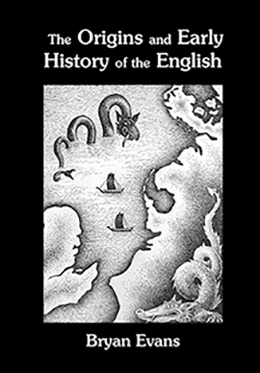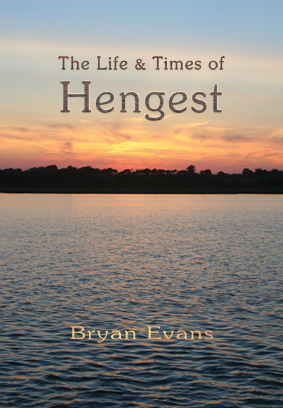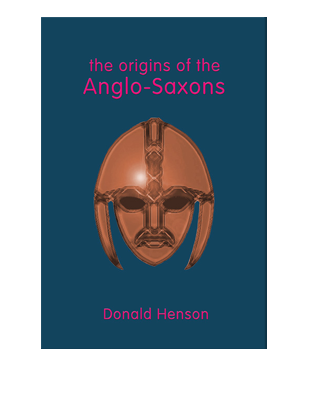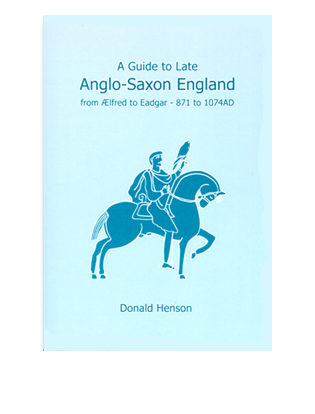|
The
Origins and Early History of the English
Bryan Evans
During the late 4th and early 5th
centuries the Roman Empire came under increasing attacks from
Germanic and other tribes. In order to strengthen their core
defences Rome moved armies away from places like Britain, finally
abandoning it and its citizens in 410.
With the Romans
gone, Britons had to provide for their own defence and in doing so
followed the Roman example by employing Germanic mercenaries. This
opened the door to Anglo-Saxon migration and settlements. As the
hold of the local British leadership slackened, forceful
Anglo-Saxon leaders were well-placed to take over post-Roman
tribal kingdoms as ‘going concerns’.
In the next phase of
the settlement, Anglo-Saxon groups pressed inland, using the Wash
and Humber river systems and Roman roads. The settlement of
Britain by Angles, Saxons and others was neither quick nor without
resistance - it varied from place to place and time to time. A
British fight-back – led perhaps by an Arthur-figure – gave a
stunning British victory at Badon Hill. Only a generation later
the Angles and Saxons were on the move once more, against Britons
weakened by their own infighting and, perhaps, by plague. Yet it
was only in the 630s that the conquest became irreversible.
The telling of this tale focuses on the human story, on
footloose adventurers, on formidable warlords, on twists of fate,
on truth and treachery, on desperate last stands and daring,
foolhardy raids.
25 maps help the reader get to grips with the twists and turns of
the plot.
£12.95 212 pages
Approx. 170 x 244mm - 6¾ x
9½ inches
The
Life and Times of Hengest
Bryan Evans
Here is the tale of Hengest set against
the end of Roman rule in Britain and the beginning of the
Anglo-Saxon conquest.
The book begins with an overview
of the wider European stage. Then, events in Britain are looked
at through the words of Gildas, Bede, the Anglo-Saxon Chronicle
and Historia Brittonum. What information can be gleaned from them
and how reliable are they? What impact have modern genetic studies
had on our understanding of the age of migration? The main arguments
concerning the extent of Anglo-Saxon migration are conveniently
summarised.
Part two provides a cultural setting
for Hengest and includes information about warcraft and beliefs.
An account of early English poetry outlines of some of the tales
that formed part of the matter of the poet: the tales of Offa
of Angeln, Heoden and Hild, Welund, Waldere.
Part three includes the Finnsburg
Fragment, the Anglo-Saxon poem that tells of Hengest. Using clues
from this and other sources the author has wrought two 'Anglo-Saxon'
poems, telling the tale of Hengest.
Includes 7 maps and 10 drawings by
the author.
£12.95 280 pages
Approx. 170 x 244mm - 6¾ x
9½ inches
The Origins of the Anglo-Saxons
Donald Henson
Did the Anglo-Saxon migration consist of
the movement of a few hundred warriors who seized power and ruled
over an indigenous population? Or was it a very mixed series of
large and small migrations over a long period which differed greatly
in nature from time-to-time and place-to-place?
Donald Henson has brought together a wide range of information
and arguments concerning the Anglo-Saxon migration to Britain.
His purpose is to examine evidence from many different disciplines
and provide a base from which a balanced and credible view of
the period
£14.95 269 pages
The English Elite in 1066
Gone but not forgotten
Donald Henson
The people listed in this book formed the
top levels of the English ruling elite in 1066. It includes all
those who held office between the death of Eadward III (January
1066) and the abdication of Eadgar II (December 1066). There are
455 individuals in the main entries and these have been divided
according to their office or position: the royal family, earls,
bishops, abbots and abbesses, the greater thanes (with lands over
£40 and officials in the King’s household), sheriffs,
royal chaplains, moneyers, foreigners settled in England and Englishmen
in exile. For many of these individuals, we have only the barest
outline of their existence, but for some we can provide some detail.
The following information, where available, has been listed for
each person:
• What is known of their life;
• Their landed wealth;
• The early sources in which information about the individual
can be found;
• Modern references that give details about his or her life.
A series of appendices provide detailed information about particular
topics or groups of people.
17 Tables
10 Family Trees
£14·95 272 pages
A Guide to Late Anglo-Saxon
England
Anglo-Saxon History
Donald Henson
Contents include: The Origins of
England; Physical Geography; Human Geography; English Society;
Government and Politics; The Church; Language and Literature;
Personal Names; Effects of the Norman Conquest. All of the kings
from Alfred to Eadgar II are dealt with separately and there is
a chronicle of events for each of their reigns. There are also
maps, royal family trees and extensive appendices.
This book has been prepared with the aim of providing school teachers,
undergraduates and general readers with both an overview of the
period and a wealth of background information. Facts and figures
are presented in an easy to find way that make this a useful reference
handbook.
6 maps & 3 family trees
£9·95
BACK
TO SUBJECT LIST
|




